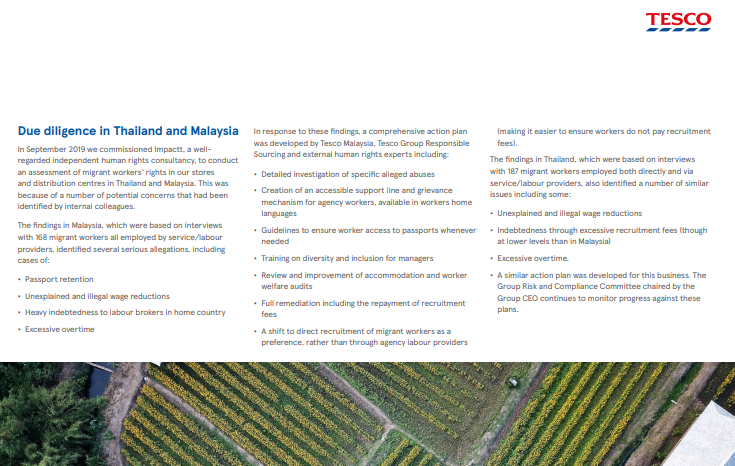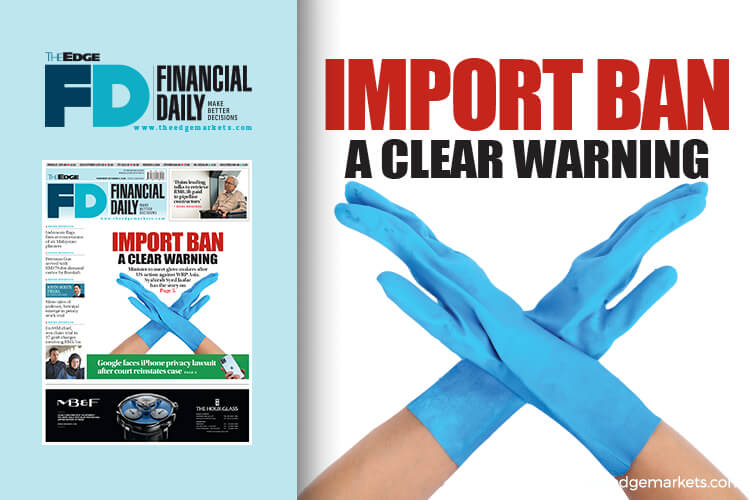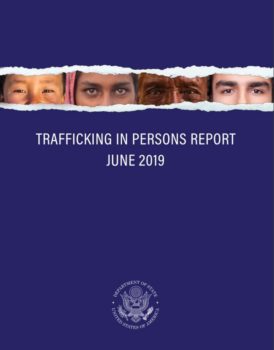Tesco’s Modern Slavery Findings
Last week, the UK-based multinational retailer Tesco released its modern slavery statement (a requirement under the UK Modern Slavery Act) which placed its Malaysian operations in the limelight. It received widespread media coverage, including from Reuters and The Edge.
Tesco commissioned Impactt, an independent human rights consultancy, to conduct an assessment of migrant workers’ rights in its stores & distribution centres in Malaysia.

After interviewing 168 migrant workers, Impactt identified several serious allegations, including cases of:
• Passport retention
• Unexplained and illegal wage reductions
• Heavy indebtedness to labour brokers in home country
• Excessive overtime
In response, Tesco has pledged to overhaul its SOPs to ensure instances of modern slavery / forced labour do not recur.
This is not the first time Malaysian companies have been embroiled in modern slavery / forced labour allegations.

Pic Credits: The Edge Markets
In October 2019, the US Customs and Border Protection (CBP) blocked imported products from medical glove-maker WRP Asia Pacific Sdn Bhd into the US on allegations of forced labour. WRP Asia has since reviewed its operations and the ban was just lifted by the CBP in March 2020.
Why is Eradication of Forced Labour Important for MNCs & Businesses in Malaysia?
There are 3 key reasons.
First, many countries which Malaysia exports to (i.e. the UK, Europe & US) have strict anti-modern slavery/forced labour policies, which empower those Governments to block or even seize such imports. The WRP Asia case in the US is on point. Under its Modern Slavery Act, the UK Government is empowered to confiscate assets which it views as proceeds of modern slavery/forced labour. It would be financially devastating for Malaysian companies to be denied access to these large markets.
Second, specifically for MNCs based in Malaysia, several countries require these MNCs to publicly disclose its anti-modern slavery/forced labour efforts throughout all of its supply chains. For example, Section 54 of the UK Modern Slavery Act mandates a host of disclosures and statements to be made by UK-based MNCs on its supply chains (which could include Malaysia). The Tesco UK modern slavery statement is on point. If one fails to do so adequately, the UK Government has adopted a name-and-shame policy.

Pic: The US Department of State Trafficking in Persons Report 2019
Third, Malaysian businesses may be criminally liable for offences under Malaysia’s Anti-Trafficking of Migrants and Anti-Smuggling of Migrants Act 2007 (ATIPSOM) and Section 374 of the Penal Code. Under ATIPSOM, “trafficking in persons” is a criminal offence. Very briefly, “trafficking in persons” is an act of acquiring and maintaining labour through coercion.
Upon conviction, one can be imprisoned for up to 15-20 years. Directors and management of the said Malaysian company are also guilty, unless he/she can prove the offence was committed without consent & due diligence has been exercised. Meanwhile, unlawful compulsory labour offences under Section 374 of the Penal Code may result in imprisonment of up to 1 year.
The 4 Takeaways
# 1. It is Illegal to Retain Foreign Workers’ Passports Without Their Consent
One of the findings in the Tesco statement is the prevalence of Malaysian employers retaining migrant workers’ passports.
Unbeknownst to many, it is a criminal offence under Section 12(1)(f) of the Passports Act to be in possession of someone else’s passport without lawful authority. One can be fined up to RM10,000 or jailed up to 5 years, or both. The key here is whether consent has been obtained from foreign workers. If employers are mere custodians of such passports with consent, it may not be an offence.
Under the UK Crown Prosecution Service’s Legal Guidance, “the person’s documents, such as a passports or other identification, being withheld by the employer” is evidence of coercion and consequently forced labour
# 2. It Is (Generally) Illegal to Deduct Wages of Foreign Workers
One of the other findings is that there has been “unexplained and illegal wage reductions”.
Under Section 24 of the Employment Act, it is generally an offence to deduct wages of employees – the exception being overpayment of wages, indemnity due to the employer, recovery of advances of wages, etc.
It is common practice for employers here to deduct wages of migrant workers as reimbursement of recruitment/agent fees, as well as rental & food. Both instances require prior permission in writing of the Director-General of Labour. Breaching any of such laws constitutes an offence and an employer may be liable to a fine of up to RM10,000.
The UK Crown Prosecution Service has listed “unwarranted and perhaps unexplained deductions from wages” as an indication of forced labour

Pic Credits: The New Straits Times
# 3. It is Illegal to Impose Excessive Overtime
“Excessive overtime” in Malaysian operations was another finding in the Tesco statement.
The Employment (Limitation of Overtime Work) Regulations 1980 provides that the limit of overtime work shall be a total of 104 hours in any one month. This averages out to about 4 hours in 1 day. The employer can apply to the Director-General of Labour for an exemption of such limit. Breaching this constitutes an offence and the employer may be liable to a fine of up to RM10,000.
According to the UK Crown Prosecution Service, “excessive working hours being imposed by the employer” is also an indication of forced labour
# 4. Heavy Recruitment Fees May Amount to Forced Labour
Tesco statement’s finding of “heavy recruitment fees” is an indicator of “debt bondage”. “Debt bondage” is when a worker pledges services to repay a debt, where the terms of the repayment are ambiguous and/or impossible to be fulfilled.
Depending on the facts, heavy recruitment fees may amount to a form of coercion and therefore constitute “trafficking in persons” under ATIPSOM and/or unlawful compulsory labour under Section 374 of the Penal Code. Upon conviction, they result in jail terms (see above).
The UK Crown Prosecution Service states that “debt bondage” and “money having been exchanged with other employers/traffickers etc. for the person’s services in an arrangement which has not been agreed with the person concerned or which is not reflected in his remuneration” are indicators of forced labour.
Conclusion
In the analysis above, I have stated the Malaysian position and also the UK position in respect of these 4 allegations in the Tesco statement. The UK position is important for the first and second reasons stated above – namely, the prospect of blocking/seizing imports from Malaysia, as well as supply chain transparency. For the sake of brevity, I have not discussed the US position.
I hope this has nonetheless been useful for MNCs and businesses based in Malaysia.
This article is merely a general discussion on the law and does not constitute legal advice. Kindly seek legal assistance moving forward.
